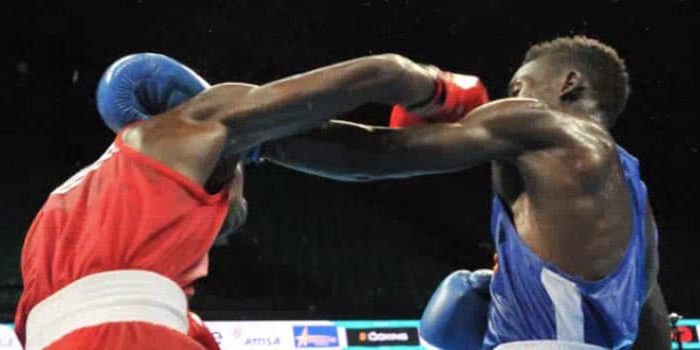During four millennia, Africans have sought fame and wealth through boxing. Ten centuries before the sport first appeared at the 23rd Olympiad, in 688 BC, Egyptian painters depicted boxers in the tombs of Merry-Ra and El-Minia.
And in February, when three Gambian boxers, their officials, and your correspondent – a coach with the team – travelled by bus to the dusty outskirts of Dakar, Senegal, we were following an ancient tradition: to try to get to the Olympics.
We were joined by Africa’s toughest fighting men and women, who were preparing to compete in the Africa section of the Tokyo 2020 Qualification Tournament.
In the minibus was Gambia’s team captain, 27-year old Foday Badjie. A resilient and explosive former professional, he had just rejoined the amateur ranks. His was a tough background: a number of his neighbourhood friends had tried to reach Europe over the last five years, some drowning during the perilous Mediterranean crossing. Others had returned steeped in failure and debt.
Badjie – the All Africa Boxing Board of Control (AABBC) super middleweight champion – knew a good showing in Tokyo could lead to a professional contract in England, and radically improved circumstances for his girlfriend and two small children. He’d carry the country’s flag in August, President Barrow had said.
Equally ambitious was the giant-handed, sunglasses-wearing heavyweight Sandy Sam, who avidly followed the weigh-in of Tyson Fury’s mega-fight with Deontay Wilder on YouTube as our bus journey to Dakar became held up by fussy Senegalese border officials.
His compatriot Musa Cham had just returned from the Bronx, having left Gambia as a boy. He stared out of the bus window as the lush fields of the Sine-Saloum Delta gave way to the Saharan sands and parched landscapes of Senegal. A lightweight with a snappy jab, quick footwork and the ability to pivot like a ballerina, Cham had only been boxing for three years.
The International Olympic Committee booked half of the $100-a-night Royal Saly Hotel for the national teams competing in the tournament, the other rooms occupied by quizzical French tourists.
Disappointing news
But we arrived to the disappointing news that South Africa’s team hadn’t made it. Nor had the Nigerians, once again. The sports ministries of Africa’s two largest economies – and proud boxing nations – had failed to find the funds to get their boxers abroad. This was the same week that Nigerian ministers welcomed Anthony Joshua to Lagos, and tried to claim him as one of their own. For Africa’s devastated young boxers, four years of blood, sweat and tears had been wasted.
Things hardly improved when Ghana – arguably Africa’s most beloved boxing nation, and the home of the legendary Azumah Nelson – landed to find their hotel fees hadn’t been paid. Cue urgent phone calls and a delayed check in.
My own family has a long history in African boxing. My Scottish grandfather ran away from Dundee to London in the 1930s, and when the Second World War broke out joined the British army. He boxed throughout the war, and after serving in the British Mandate of Palestine, he was sent to Ghana, then known as the Gold Coast. Working as a physical training instructor, he helped lay the foundations of the Ghanaian boxing team, while coaching and refereeing throughout the country until Ghana’s Independence in 1957.
After teenage years spent boxing in England, I thought I’d see what all the fuss was about. I took a flight to Accra to test myself at the Attoh Quarshie Boxing Gym, a renowned stable that included world title contender Joshua Clottey.
It didn’t take long to realise I wouldn’t cut it in the professional ranks. Needing balm for my bruised ego and nose, I turned to the words of another fellow amateur boxer, Nelson Mandela, who said; “I was never an outstanding boxer. I was in the heavyweight division, and I had neither enough power to compensate for my lack of speed, nor enough speed to make up for my lack of power.” Unbowed by my painful induction, I started coaching in Gambia after filming Badjie for a documentary.
But boxing can be an unforgiving sport, and the Tokyo 2020 Qualification Tournament brutally exposed weakness. Sandy Sam got stopped by Congo’s Maroy Sadiki in the first minute of the preliminary round as the pressure of fighting in the 15,000 capacity Dakar Arena overwhelmed his pre-fight tactics. Sam walked back to the changing rooms with the sounds of vuvuzelas – and Sadiki’s fists – ringing in his ears. Musa Cham won his preliminary bout by a first round knockout, but then lost against a 19-year-old Ethiopian, whose fitness defied belief.
Elsewhere, the continuation of the historic rivalry between the North African nations and their sub-Saharan opponents continued unabated. The nip and tuck of Algerian and Moroccan fighters – who secured 13 of the 33 places on offer – habitually gets the better of their foes from the tropics, and this year was no exception.
But perhaps the greatest story emanated from Zambia. The nation took three young boxers to Senegal, and all qualified in style in the stadium at Diamniadio, the futuristic city built to ease congestion in Dakar. Flyweight Patrick Chinyemba boxed in an unorthodox, frantic style. His hands held high and outwards, shifting rhythmically from side-to-side, he relied on youthful reactions as he joyfully boxed his way to the final.
As for Badjie, the late evenings and meal times at the hotel taught us all a lesson, as he failed to make weight one morning by 1kg. He might get one final opportunity in Paris, in May, at the World Qualifiers, if the money to get him there can be found.
If it is, he’ll be joined by Senegal’s best boxer, whose pre-bout routine was interrupted by an Olympic official who refused the fighter’s bid to tuck a magical amulet inside his shorts.
Magic or not, when in Africa, and where there’s boxing, there’s drama, in and out of the ring.
–africanbusinessmagazine.com







